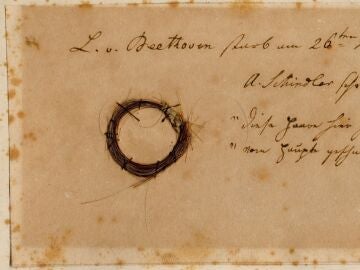
In 1802, Ludwig van Beethoven asked his doctor, JA Schmidt, to publicly describe his condition after his death. progressive hearing loss and its gastrointestinal problems so that “as far as possible, at least the world would reconcile with me.” Since then, the causes of Beethoven’s death have been a mystery.
Now, more than two centuries later, a team of scientists has fulfilled his wish and, after analyzing the DNA of five locks of her hair -previously authenticated-, has not found an explanation for his deafness or his gastrointestinal problems, but he has discovered that the famous composer had a genetic predisposition to liver diseases.
Details of the research, carried out by the University of Cambridge (United Kingdom), the Beethoven Center San Jose and the American Beethoven Society of California (United States), the University KU Leuven (Belgium), the University of Bonn, the Beethoven- Haus de Bonn, and the Max Planck Institute for Evolutionary Anthropology (Germany), are published this Wednesday in the journal Current Biology.
“Our aim was to shed light on Beethoven’s health problems, including progressive hearing loss, which began in his mid to late 20s and led to the functional deafness in 1818“, explains Johannes Krause of the Max Planck Institute.
In addition, the team also looked for the possible genetic origin of Beethoven’s chronic gastrointestinal complaints and of severe liver disease (possibly cirrhosis) which culminated in his death in 1827, at the age of 56.
A “very regular” alcohol consumption
The DNA found no answer to any of these health problems but did uncover genetic factors for liver disease and evidence that he had suffered from HIV infection. hepatitis B in the months prior to his death who were aggravated by alcohol and the composer’s genetic risk.
“We can deduce from Beethoven’s ‘conversation books’, which he used during the last decade of his life, that his alcohol consumption was very regularalthough it is difficult to estimate the volumes consumed,” explains Tristan Begg, lead author of the study and a researcher at Cambridge.
And while most sources point to its consumption being moderate by early 19th century Viennese standards, it is likely that it reached amounts of alcohol known today to be harmful to the liver.
Regarding the hearing loss, the DNA analysis failed to identify a clear genetic basis, although the researchers caution that the study is not sufficient to rule out this hypothesis. The authors also found no genetic explanation for Beethoven’s gastrointestinal problems, but note that celiac disease and lactose intolerance “are highly unlikely.”
“We can’t say definitively what killed Beethoven but now we can at least confirm the presence of significant hereditary risk and hepatitis B virus infection,” Krause concludes.
A surprise in Beethoven’s chromosome
“Based on the known medical history, It is very probable that it was some combination of these three factors, including his alcohol consumption, acting in concert, but future research will have to clarify the extent to which each factor was involved,” adds Begg.
In addition, Beethoven’s DNA held another surprise: his chromosome. And it does not coincide with that of any of the five current relatives who bear his last name and share, according to genealogical records, a common paternal ancestor.
That is to say, at some point in the generations on the part of Beethoven’s father there was an extramarital “event”concludes the study.
“This finding suggests an event of extraparental paternity in his paternal line between the conception of Hendrik van Beethoven in Kampenhout (Belgium) around 1572 and the conception of Ludwig van Beethoven seven generations later, in 1770, in Bonn (Germany)”, concludes Begg.
Source: Lasexta
Bruce is a talented author and journalist with a passion for entertainment . He currently works as a writer at the 247 News Agency, where he has established himself as a respected voice in the industry.












